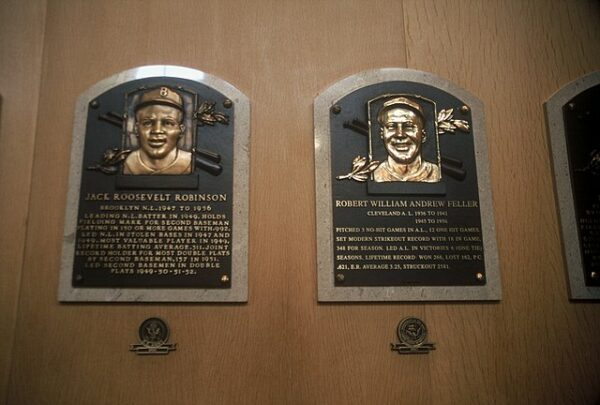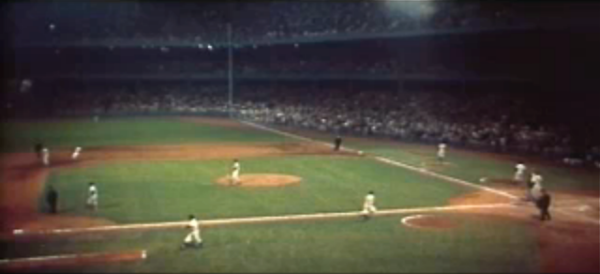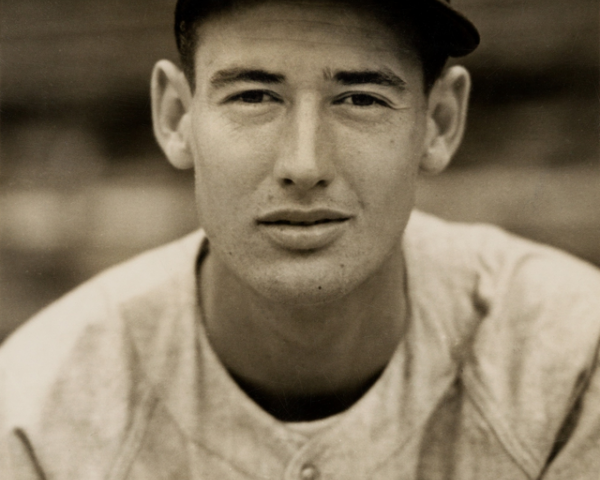Jackie Robinson is not just a monumental figure in baseball history, but he also changed American history and left an enduring impact on the nation’s social fabric. On July 23, 1962, he became enshrined forever in Cooperstown.
Born on January 31, 1919, in Cairo, Georgia, Robinson’s early life was marked by struggles against racial prejudice and discrimination. However, it was his exceptional athletic abilities that provided him with a gateway to prominence, making him a national hero both in sports and in society. At UCLA, Jackie excelled in multiple sports, he knew he could play in the Big Leagues if he could only receive a shot.
“In early 1945, Jackie Robinson was signed by the Negro League team the Kansas City Monarchs, where he starred for one season, hitting .387,” writes The History Channel.
At the time, Brooklyn Dodgers executive Branch Rickey was scouting the Negro Leagues, looking for players who not only had the talent but the demeanor to withstand the pressures associated with integrating Major League Baseball. Robinson was one of several players Rickey interviewed in August 1945 for assignment to the Dodgers’ farm team in Montreal, the Royals.
It is said that during the interview, Rickey demanded that Robinson not respond when on the receiving end of racial abuse. Robinson reportedly said, “Are you looking for a Negro who is afraid to fight back?” To which Rickey replied that he was looking for a person “with guts enough not to fight back.”
Once Robinson agreed to ‘turn the other cheek,’ a Biblical phrase used by the religious baseball executive, he was assigned to the Royals for the 1946 season, where he was embraced by Montreal fans and batted an impressive .349. His performance both on and off the field earned him a call-up to Brooklyn the following season.
Robinson broke the color barrier in baseball when he debuted for the Dodgers on April 15, 1947, signing with the Brooklyn Dodgers. Enduring the brunt of racial taunts and antagonism, Robinson maintained composure and grace, setting a remarkable example of dignity in the face of adversity. His debut season proved pivotal, earning him the Rookie of the Year award and establishing him as a formidable player on the field.
“Robinson retired with a .313 batting average, 972 runs scored, 1,563 hits and 200 stolen bases. He remained active in the game as an announcer, and also lent his support to many societal causes, notes to The Hall of Fame.
Beyond his prowess as an athlete, Robinson was an advocate for civil rights and social change. His involvement in the struggle for racial equality further solidified his place as a transformative figure in American history. By using his platform to challenge discriminatory practices, Robinson became a symbol of hope for African Americans and garnered admiration from progressive individuals across the country. His courage and commitment to the cause helped pave the way for the burgeoning civil rights movement of the 1950s and 1960s.
Jackie Robinson’s enduring legacy extends far beyond his contributions to the sport of baseball. He remains an emblem of resilience and progress, demonstrating how one individual’s determination can reverberate throughout society. As a pioneer in desegregating professional sports, Robinson’s impact on the trajectory of the civil rights movement remains unparalleled. Today, his memory stands as a testament to the power of perseverance and the potential for sports to serve as a catalyst for societal change. In the annals of American history, the name Jackie Robinson will forever be etched as a beacon of hope and progress in the face of adversity.
“Jackie Robinson made my success possible,” said Dr. Martin Luther King Jr. “Without him, I would never have been able to do what I did.”
Robinson’s 1962 Hall of Fame speech can be seen below.
He passed away on October 24, 1972.






